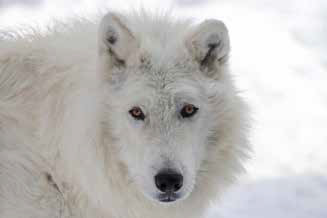Axel, a nearly eight-yearold arctic wolf with a bright white coat and an excitable personality, was euthanized on Sunday. He was a popular ambassador at the International Wolf Center, teaching thousands of visitors about wolf behaviors and adaptations.
On Friday morning, April 19, wolf care staff reviewed security camera footage and observed Axel having a seizure. He was moved to the retirement enclosure, which allowed staff to closely monitor him 24 hours a day.
On Saturday night, he exhibited a few behaviors that led staff to conclude he was feeling worse, but he still kept eating and consistently greeted the wolf care team.
The Center’s veterinarian, Dr. Kristine Woerheide, was consulted and helped develop a plan for a blood draw so lab work could be completed at the nearby Ely Veterinary Clinic in Ely. Unfortunately, the lab work confirmed that Axel was in severe kidney failure. The effects of extreme kidney failure likely contributed to his seizures.
After consultation with the wolf care team and Dr. Woerheide, it was agreed that because of Axel’s complex medical condition, the irreversible kidney failure and concerns about his quality of life going forward, humane euthanasia was the only option.
Axel passed away surrounded by his wolf care team.
“This is a big loss for all of us, but our team came together to support each other and make the right decision for Axel,” said Krista Woerheide, the interpretive center director in Ely.

“Axel is already greatly missed by our care team and everyone who knew him, but we are certain that we made the right decision for him,” said wolf curator Giselle Narváez Rivera. “We also made sure that his last day was peaceful and that he was surrounded by people who shared a strong bond with him.”
Axel and his littermate, Grayson, came to the International Wolf Center in 2016 from a facility in Canada. Grayson is still a member of the Exhibit Pack. Axel, Grayson and their packmates have educated tens of thousands of visitors at the Center in Ely and thousands of people worldwide through regular YouTube videos, wolf logs and webcams.
“Our ambassador wolves allow people to observe real wolf behavior, which can inspire learning and dispel myths about wolves,” said Grant Spickelmier, executive director of the International Wolf Center. “People also build strong connections with our ambassadors, which makes the loss of Axel hard for our whole community.”
.jpg)









